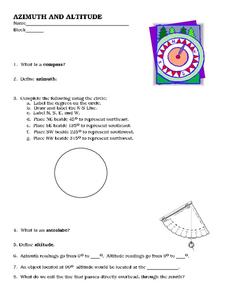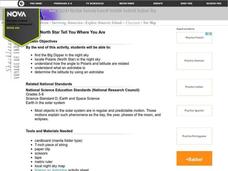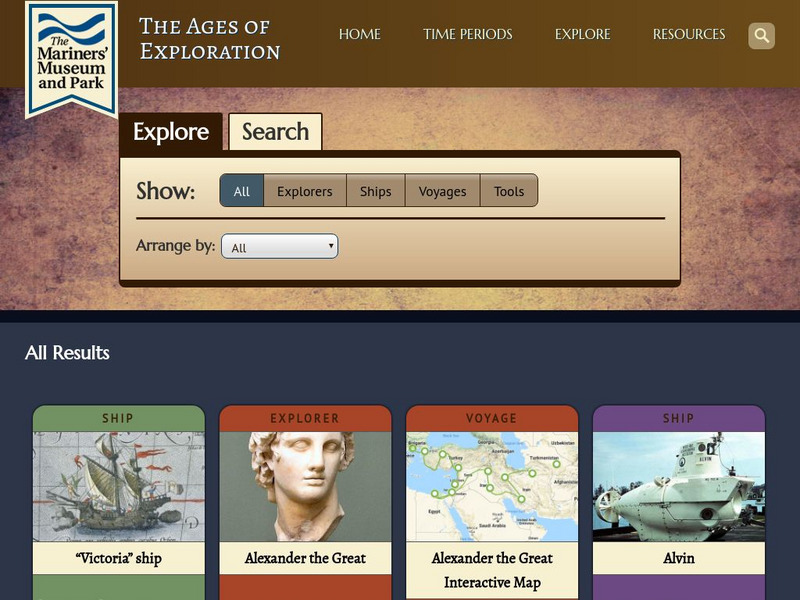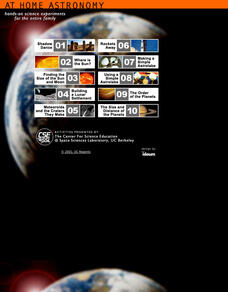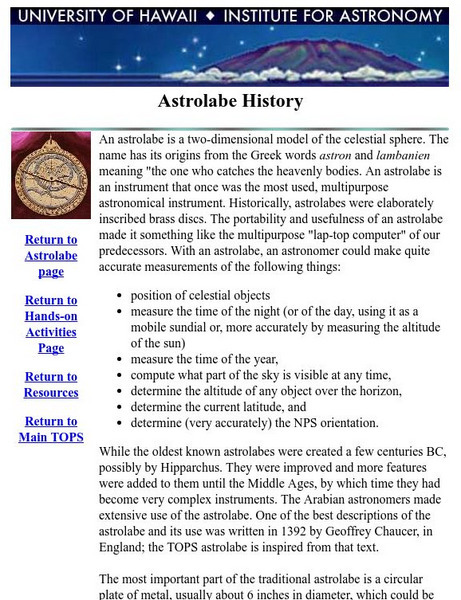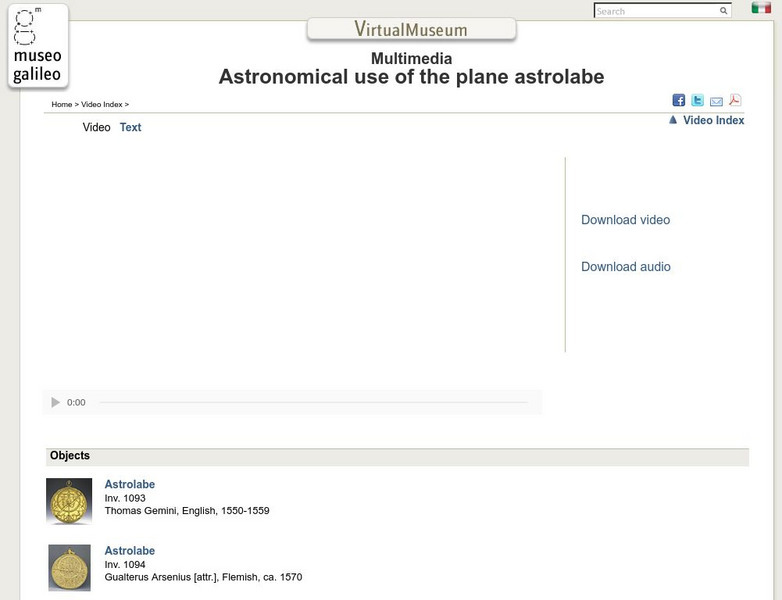Curated OER
Where Am I?
Extensive background on marine navigation is provided for you as the teacher. Assign groups to research marine navigation techniques and construct astrolabes. Resource links are listed for extension ideas. If you are teaching an...
Curated OER
Astrolabe Lab
In this astrolabe learning exercise, students use a compass rose and an astrolabe to measure altitude and azimuth of five objects in the room and 5 objects outside the room. They answer questions about these two types of measurements.
Curated OER
Stars and Constellations
Ninth graders investigate how ancient cultures viewed their world in terms of astronomy. They read and discuss an informational handout, construct an astrolabe, and locate stars and constellations using star charts.
Curated OER
From Where to Where?
Students find locations based upon their latitude and longitude coordinates. In this latitude and longitude lesson, students locate points on a grid and learn how to use an astrolabe.
Curated OER
Azimuth and Altitude
In this altitude activity, students define compass, azimuth, astrolabe, and altitude. Students use a protractor to determine the altitude of the given stars on a graph. This activity has 7 short answer questions and 8 fill in the blank...
Curated OER
Improve Your Astrolabe
For this astrolabe worksheet, students answer questions about the astrolabe's use. They write five ways they can improve their astrolabe.
Curated OER
Let the North Star Tell You Where You Are
Young scholars participate in activities in which they find the Big Dipper and locate the North Star in the night sky, examine the relationship between the angle to Polaris and latitude, and determine latitude by using an astrolabe.
Curated OER
Create an Astrolabe Instructions for Teachers
Students, who are teachers, make an astrolabe using the given pattern. They examine the uses of an astrolabe and apply the worksheets in their classrooms.
Curated OER
Rocket Physics
Students investigate the relationship between impulse, momentum, kinetic and potential energy and aerodynamic drag. In this physics lesson, students calculate data taken from launching a rocket. They compare the theoretical and...
Curated OER
Astrolabe Activity
Students study how to use an astrolabe, define terms and understand the relationship between angle and altitude. In this astrolabe lesson students complete an activity, record their measurements and complete a handout.
Curated OER
What's Your Latitude?
Students measure the height of items using an astrolabe. In this latitude instructional activity students construct a sextant and determine height and latitude with it.
University of Oxford (UK)
The History of Scientific Instruments Used in Europe
Medieval and Renaissance-era scientific instruments are catalogued and displayed. Find references to the makers of the instruments and the ways the tools were once used.
Mariners' Museum and Park
Mariners' Museum: The Ages of Exploration: Ancient
This Ancient Exploration page presents marine technological innovations, types of ships, and information about Alexander the Great. It covers the period of time from 5000 BCE to 476 CE. Each item links to a page of additional information...
Mariners' Museum and Park
Mariners' Museum: Age of Exploration: Tools of Navigation
Sailors improved on many of the tools used in navigation to help them in their long journeys across an ocean. On this site from the Mariners' Museum, find many of these tools, perhaps in use already in the 15th century, but made even...
Annenberg Foundation
Annenberg Learner: Renaissance: Exploration and Trade
Detailed introduction on exploration and trade during the Renaissance. Provides an overview of the tools created during the Middle Ages that made such travels by sea possible as well as insight into the types of goods traders sought in...
University of Oxford (UK)
Mhs: Astrolabe Chronology
Find examples of models of the astrolabe arranged in chronological order. The Museum of the History of Science houses the largest collection of astrolabes and many are shown on this site. Click on each one for a close-up lock and...
Other
Boat Safe Kids
This is a delightful site about boats and boating. Lots of games plus a terrific overview of the history of navigation. Includes a visit to a reproduction of Columbus' Nina.
University of St. Andrews (UK)
University of St. Andrews: Mariner's Astrolabe (1616)
A page on the Mariner's Astrolabe describes its origins and how it is used. A photo also accompanies the article.
University of California
At Home Astronomy: Hands on Science Experiments for the Entire Family
A collection of ten hands-on science experiments for the entire family that will help you understand concepts in astronomy. Make an astrolabe, find the size of the sun and moon, build a lunar settlement, find out about meteoroids, shadow...
University of Hawai'i
History of an Astrolabe
This site offers a definition and history of the astrolabe. There are links for additional information and acitivities.
PBS
Pbs Teachers: Shackleton's Antarctic Odyssey: Let the North Star Tell You Where
Through this lesson, students will understand how to determine latitude and locate specific stars in the night sky. They will also have a chance to build and use an astrolabe.
University of Calgary
Uof C: Advances in Shipbuilding and Navigation
This site gives information on technical advances in Portuguese shipbuilding and navigational tools.
Institute and Museum of the History of Science
Museo Galileo: Multimedia: Video: Astronomical Use of the Plane Astrolabe
Invented in ancient Egypt, the plane astrolabe is a tool used by astronomers and navigators to determine time and identifying positions of the Sun, Moon, stars, and planets. Read text or view the video to understand the details of its...
Annenberg Foundation
Annenberg Learner: Renaissance Explorers
Overview of the motives behind the exploration of the "new world" during the Renaissance. Discusses the trading that took place between the "new world" and Europe and various riches offered in Mexico and Latin America.




